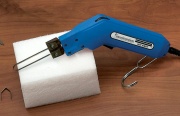Difference between revisions of "Plastazote"
(Created page with "thumb|Plastazote == Description == [Zotefoams Limited] A trademark for a crosslinked Polyethylene foam that is expanded...") |
|||
| Line 7: | Line 7: | ||
Zotefoam; Propozote (polypropylene); Evazote® (polyethylene); Supazote (polyethylene) | Zotefoam; Propozote (polypropylene); Evazote® (polyethylene); Supazote (polyethylene) | ||
| + | |||
| + | Similar products: Volara | ||
== Other Properties == | == Other Properties == | ||
Revision as of 12:31, 14 December 2019
Description
[Zotefoams Limited] A trademark for a crosslinked Polyethylene foam that is expanded with nitrogen gas. Plastazote® is chemically and biologically inert. Plastazote® products are supplied as sheets, rolls, rods, or slabstock. As with other polyethylene products, these foams deteriorate, shrink, and/or warp in direct sunlight. Similar products by the same company are Propozote (Polypropylene), Evazote® (polyethylene) and Supazote (polyethylene). All Zotefoams exhibit very low emission of volatile species up to temperatures of 190C.
Synonyms and Related Terms
Zotefoam; Propozote (polypropylene); Evazote® (polyethylene); Supazote (polyethylene)
Similar products: Volara
Other Properties
Available in several densities and thicknesses (2-27 mm). Select from low density polyethylene (LDPE) or high density polyethylene (HDPE)
Hazards and Safety
Softens at 105-115C and decomposes at 300C.
Combustion products are carbon monoxide and water.
Additional Information
Preserv'Art: Plastazote
Sources Checked for Data in Record
- Pam Hatchfield, Pollutants in the Museum Environment, Archetype Press, London, 2002
- Ceramics and Glass Conservation Section, List of Workshop Materials, The British Museum, London
